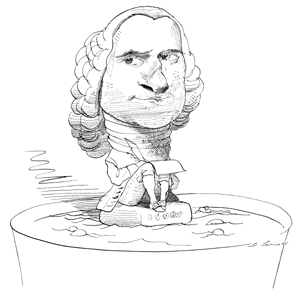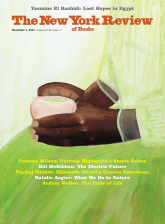In response to:
Whose Freedom? from the September 23, 2021 issue
To the Editors:
In his review of Tyler Stovall’s White Freedom: The Racial History of an Idea [NYR, September 23], David A. Bell wrongly states that “Jean-Jacques Rousseau did not mention European colonies in his abstract condemnation of slavery in The Social Contract.” In fact, when Rousseau proposed that a healthy population and birth rate was “the most reliable sign” of “good government,” he added a qualifier that hints, at a minimum, at his awareness of colonial exploitation: “All other things being equal, the government under which, without recourse to extraneous means, with no naturalization or colonies [emphasis added], the citizens most flourish and multiply is indubitably the best.” This is not to suggest that The Social Contract is an anticolonial work as the reference to colonies is easily missed. Rousseau’s “abstract condemnation” of slavery, though, was remarkably expansive as well as based on many concrete historic references, covering everything from physical slavery (“the right of slavery is void”) to body politics (“to be driven by our appetites alone is slavery”), religion (“true Christians are made to be slaves”), representation (“as for you, the modern nation, you have no slaves, but are enslaved”), and wealth (“finance is for slaves”).
Exactly because Rousseau’s discussion of the concept of slavery was so expansive, is his lack of concern for race-based slavery so symptomatic. Mercer Cook put a spotlight on Rousseau’s racism in 1936, as did Emmanuel Eze on Immanuel Kant’s racism in 1997. Of course, abolitionists used his work even though Rousseau was no abolitionist. Nevertheless, pointing to the remarkable achievements of anticolonial revolutionary leaders—Jean-Baptiste Belley and Toussaint L’Ouverture come to mind—to downplay Enlightenment racism strikes me as problematic precisely because Rousseau and Kant did not develop their arguments on freedom as abstract and value-neutral ones. How much greater would have been their “liberatory potential” if many Enlightenment thinkers had not turned prejudice into a quasi-scientific racial taxonomy?
Regina U. Gramer
Clinical Associate Professor
Managing Editor of The Interdependent
Liberal Studies
New York University
New York City
David A. Bell replies:
My thanks to Regina Gramer, but I’m afraid it is she who is misreading Rousseau. In the passage she cites, Rousseau’s point is that colonies increase the populations of the states that founded them. For a man as besotted with the classical world as he was, the category certainly included, in the first instance, the colonies of ancient Greek city-states, so it cannot be taken as applying specifically to the European colonies of his own day. Nor does the passage mention exploitation of enslaved people in any way. The racial attitudes to which Gramer refers themselves made it unlikely that Rousseau, in The Social Contract, would have devoted attention to the horrific conditions of the enslaved in the European overseas colonies. It is a terrible blind spot in his work. My point in my review, however, is that Rousseau’s ideas had a force and a generative power that went well beyond the conscious intentions of their author. Indeed, they soon helped drive momentous changes that he himself never dreamed of.




